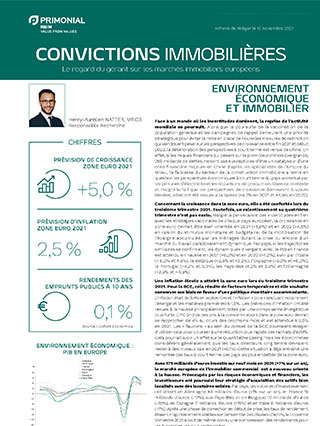Real Estate Convictions Europe : 2nd quarter 2022
With the war in Ukraine having triggered a costly crisis, the timing of any end to the conflict remains unclear.
The economic repercussions of the crisis will contribute to a marked slowing of global growth in 2022 and will fuel inflation. These factors have led to a fresh downgrade in expectations of global growth to 3% for 2022, from 3.8% at the beginning of the year. Central banks are currently focusing their attention on the tools to deploy in reducing inflation. The economic cost of measures is currently less of a priority for them than the arresting of inflationary pressures.
On the economic front, the Eurozone faces a further deterioration in prospective growth in 2022 (to 2.7%). The likelihood of a recession has increased, but this has not become a certainty. The level of economic activity remains high, and several indicators continue to be positive. This said, the impact on individual European economies differs widely. Germany (1.3% growth in 2022), Belgium (2.1%) and France (2.3%) are the countries hardest hit by the geopolitical pressures, whilst the Netherlands (3.0%), Italy (3.5%) and Spain (4.5%) are still performing well relative to the European average.
The war in Ukraine has resulted in a sharp increase in prices for energy and agricultural goods. In addition, shortages of materials, equipment and labour following the pandemic are also pushing up prices. These circumstances led the ECB to take stronger than expected action, with a 50 basis point hike in its policy rates on the 21st of July 2022 in an attempt to tackle the sharp rise in inflation (8.6% for the 12 months to end-June). Forecasts suggest that inflation for 2022 will nevertheless be high (7.1%) and the target of bringing consumer price inflation back to 2% will be met only in the medium term.
This increase in rates mark the end of the era of negative interest rates, which has resulted in a rise in the cost of money (+1.7% for 2022). Meanwhile, the ECB plans to monitor spreads and introduce mechanisms to prevent it from widening unjustifiably; in order to avoid any new sovereign debt crisis in the Eurozone.
Despite a limited impact on financing conditions during the first half of 2022, coupled with the uncertain economic and geopolitical context, the European real estate market1 saw total investment of €136 billion (up 6% over a year).
Looking at the major countries, investment volumes were €40 billion in the UK (stable over the year), €23 billion in Germany (-28%), €16 billion in France (+11%), and €6 billion each in Italy (+70%), the Netherlands (-12%) and Spain (+13%).
Offices were the dominant asset class, with €45 billion, followed by residential (€33 billion), logistics (€31 billion), retail (€18 billion), hotels (€6 billion) and healthcare (€3 billion).
Following the ECB’s decision to raise its policy rates, the conditions for access to financing has changed very quickly. Although yields were mainly stable in the second quarter of 2022, some decompression was seen in response to expectations of bonds yield increases. In a smaller proportion of the market, yield compressions were observed for the most sought-after assets.
We are therefore seeing a reworking of the landscape, the scale of which is still hard to quantify. Investors are likely to move into a period of observation whilst price corrections, if indeed there are any, take place. It could suggest that investors are going to adjust their acquisition strategies to seize the best opportunities and continue to invest in the most secure assets given the context, as the appetite and liquidity is still there.
1 The real estate market refers to offices, retail, logistics, services and residential real estate for institutional clients.
Sources of data: CBRE, Eurostat, IMF, RCA, Oxford Economics..

The team

Henry-Aurélien Natter joined Praemia REIM as Research Manager in January 2018. He has the mission of developing the analyses of the Research & Strategy Department on the real estate markets, the economy and capital in France and in Europe.
Henry-Aurélien Natter began his career at Les Echos Etudes (formerly Eurostaf), then at C&W (formerly DTZ), and lastly at BNP PRE, where he acquired solid and varied experience in real estate research, strategy and finance. He is qualified with an AES degree in Business Management, a Masters Decree in management and SME management, and an International Master in commerce and marketing.
You may also like

- Market review
Real Estate Convictions : Q4 2024
The continued reduction in ECB interest rates, the level of savings amongst Europeans and the recovery of the real estate markets between 2022 and 2024 all point to the potential for improvement and a rebound in the sector.

- Market review
Real Estate Convictions : Q3 2024
In October 2024, the ECB announced its third consecutive rate cut to ease its restrictive monetary policy, and we believe that a new momentum has opened up for the European real estate market. Indeed, this quarter we have seen a thaw in certain real estate indicators.

- Market review
Real estate convictions : 1st quarter 2024
For now, European real estate professionals have been cautious and are watching for the tipping point that could occur with the announcement of the first change in direction by the ECB.


 et Firefox
et Firefox 